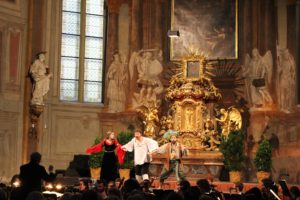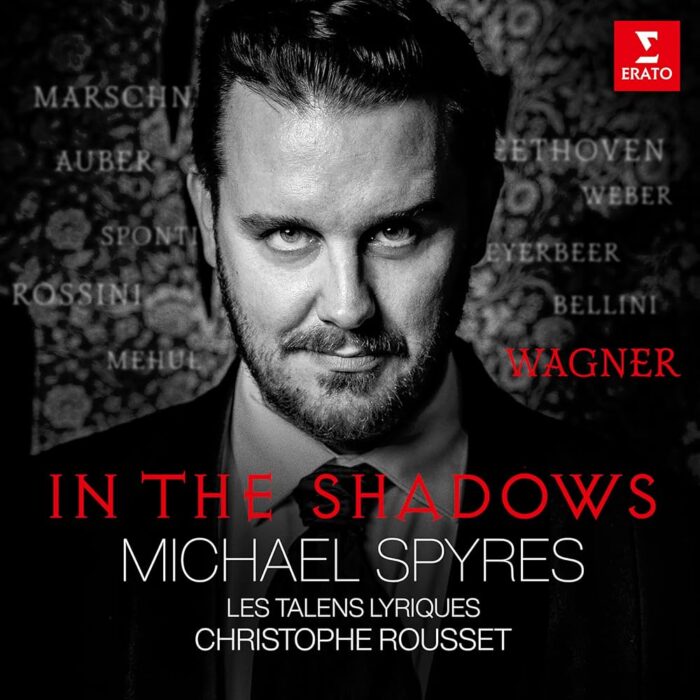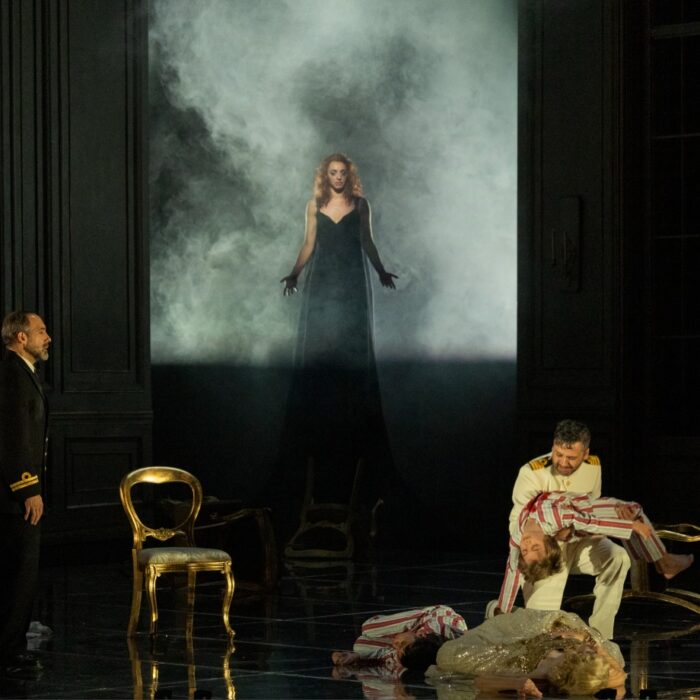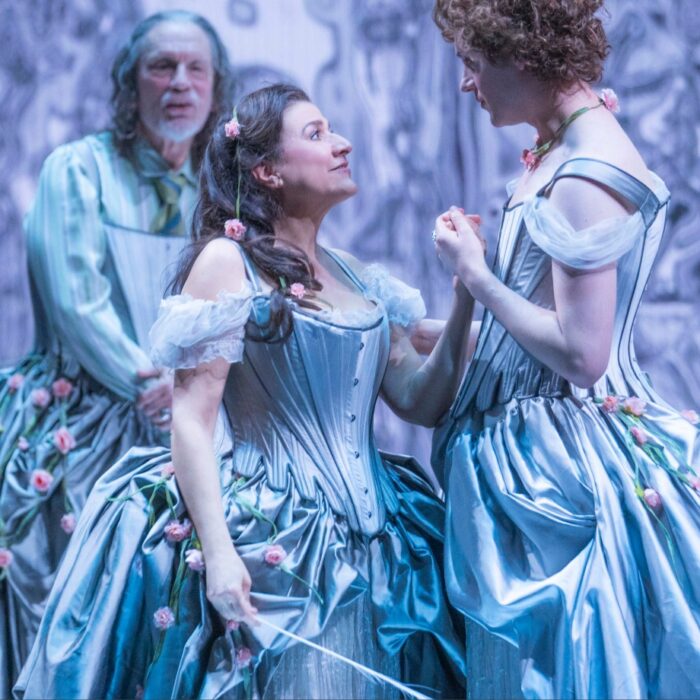
Prague Summer Nights 2017 Review – Die Zauberflöte: An Energetic Evening Filled With Promising New Voices
By Francisco SalazarThe Prague Summer Nights kicked off its operatic selections on July 1, 2017, with a production of “Die Zauberflöte” with one major caveat.
Due to renovations at the Estates Theater, the festival was forced to move all its opera productions and concerts to the St. Simons and Judes Church for this year’s festival. While it definitely limits the possibilities of what can be done on stage and the acoustics may not always be ideal for soloists, director Joachim Schamberger, or conductor Arthur Fagen, the ensemble put together a rousing rendition of Mozart’s mythological opera.
The Soloists
Being a young artist program, for many, it was role debut or a first major role. Whatever was the case, each performer showed promise, particularly Anna Kozlakiewicz as Pamina and Dominic Veilleux as Papageno.
Kozlakiewicz possesses a rich lyric soprano with a strong top. When we first see her Pamina, she is a woman suffering as she has been imprisoned by Sarastro. Her voice emphasized this suffering with a darker quality. However, once Tamino arrived, her singing obtained a brighter color and she shaped each phrased with even more elegance. Her duet with Veilleux was a stand-out as both singers played each other and created dynamic comic timing. But it was during the second act that she displayed her tremendous promise. In the aria “Ach ich fühl’s,” Kozlakiewicz shaped each phrase as a lament. Each time her singing was more intense and the high register bloomed with greater power over the orchestra. As she sung the aria, the soprano also evolved her character from a strong woman to a frail and tortured one. For this writer, it was the moment that stole the show.
As Papageno, Veilleux showcased comic timing and made it hard to look away as his energy was contagious each time he set foot on stage. From his first appearance, he brought great energy, moving with grace, jumping, twirling with his bells and playing his instrument. His voice obtained radiant colors in his first aria showcasing a strength for the text and creating a smooth and beautiful sound. When Sarastro captures Papageno and Tamino and they are forced to go through trials, Veilleux first refused and complained like a child but quickly changed to all smiles when he heard he would get a Papagena. The moment drew true laughter as Veilleux put on the face paint quickly and smiled about.
In his second act aria, known as the Suicide Scene, Veilleux showed a true booming baritone as he luxuriated in the longer lines Mozart wrote during the scene. However, when he is told to play his bells, the tone returned to quicker patter lines and a brighter timbre. He relished each moment playing with the bells and made sure to shape each phrase in a different way. The duet with Papageno followed with Illanna Starr, a truly beautifully staged moment that was not only tender but hilarious. When Starr and Veilleux see each other, Veilleux immediately started dancing emphasizing the P in “pa,” his surprise palpable. Starr followed with similar phrasing until their voice melted together for the middle section. Then they went on to play with the three spirits and argue about children as they sang with full tone. It was a fun and moving moment.
As Tamino Ting Li showed a strong tenor. The sound is a bit darker from the lyric tenors one might expect in this role but that actually worked for the character that Li created. Li’s first entrance showcased a strong voice that easily resonated throughout the hall. But even when he was singing out, he was also capable of subtlety and in his aria “Dies Bildnis ist bezaubernd schön,” he brought out a beautiful pianissimo color effortlessly coupled with polished legato line. Li also showed flexibility in his voice during his final trial as he dispatched the coloratura lines that Mozart wrote for Tamino. In the final duet with Kozlakiewicz’s Pamina, the two coupled their voices in unison bringing the work to a cathartic conclusion.
As the Queen of the Night, Camille Chapron showed off an impressive high register. Chapron’s voice may not have been the biggest in the hall but she still pulled off the virtuosic music with ease. During her first aria “O Zittre Nicht,” she melted into the melodic line, shaping each phrase with ease and creating a portrait of a sympathetic character. It was a lament for losing her daughter and one that could easily express this queen as a good character. During the second portion, where Mozart asks the soprano to dispatch instrumental coloratura, Chapron struggled to stick with the orchestra. However, when all was said and done, she triumphantly landed on her High F, making for a rousing climax. The second act aria “Der Holler rache” was sung with authority and clarity. Each F was hit with intensity and accuracy and the coloratura was tremendously calculated in its execution. One thing that was interesting about the end of Chapron’s Queen of the Night was that unlike most, she was forgiven at the end, giving her a happier ending.
Bongani Ndhlalane showed off a refined tone as Sarastro, performing his arias with subtlety and a beauty of tone. This, of course, helped to showcase a benevolent character, never putting in doubt his good side. Still, it allowed Ndhlalane the many colors in his voice.
As the three spirits Clark Davis, Emma King, and Megan Wheeler showed grace and charisma on stage while Emilie O’Connor, Samantha Lang and Gabriella Fagen were playful as the Three Ladies. Nicholas Branson was not your typical ugly Monastatos but instead a more insecure character moving about slowly and almost with a hunch. Charles Calotta and Lewis Barber were solid as Priests and Guards while Jeremy Aye played the speaker.
The Orchestra and Chorus
Arthur Fagen led the Chorus and Orchestra to some very rousing moments. The orchestra started off with a romantic and energetic overture, the music crescendoing and gaining momentum as it moved to the conclusion. Each repetition gaining more volume until it ended with explosive energy that previewed what was to come.
The orchestra supported the singers throughout the night, never getting in the way or covering them. Of course, it did resonate more than usual due to the lack of a pit. But it only created a more intimate setting that suited the opera.
The chorus can not be ignored as it plays a pivotal role in the opera. Mozart wrote some of the most moving and exciting choral music for this opera. From the conclusion of the first act to the men’s chorus during the Pamina and Tamino duet in Act two and the final chorus, the vocal ensemble resonated with an angelic quality throughout the hall. If the soloists were exciting to listen to, each time the chorus sang, the hall was filled, creating for numerous visceral moments.
Overall this was a solid performance of “Die Zauberflöte” and one that showed numerous promising singers at the start of their careers.


